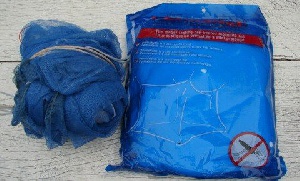Some farmers in the Upper West Region have resorted to the use of treated mosquito nets to grow seedlings on their farms.
The treated nets were freely given to households by the Ghana Health Service, to protect children and pregnant women in the fight against malaria in the region.
Ironically, the Upper West Region for years had led the malaria prevalence rate by 51 for children between 6 and 59 months followed by the Northern Region with 48 percent, and the Greater Accra Region which is last with 4%.
There have been various interventions by the Ghana Health Service and the Ministry of Health through public education and the provision of treated mosquito nets to pregnant women and lactating mothers, to fight the alarming malaria prevalence rate in the Upper West Region.
The trend where some farmers have resorted to the use of the treated mosquito nets to grow seedlings on their farms, is of concern to stakeholders in the health sector, who have heightened public education to reverse the trend and to make gains in reducing malaria cases in the region.
During a visit by TV3 to Dapuha, Loupora and Boli communities all in the Wa municipality, some farmers had used the mosquito nets to cover their nursery beds on their farms.
Ahmed Mahama, a pepper farmer told TV3 he has tried growing his seedling using all means this year but it failed. He claimed that with the help of the treated mosquito net, the pepper seedlings are doing well.
’’I don’t feel comfortable when I sleep under the net, so I learnt from other people about how to use it on the farm" he said.
From such misconceptions, it appears public education and sensitization, may not have gone down well with some of these rural folks or perhaps they simply ignore the message based on their beliefs.
In an interview with TV3, the Deputy Upper West Regional Health Director of Clinical Care, Mr. Owusu Ansah , said there is not much they can do in such circumstances except to heighten awareness.
He added that some persons are also using the nets for fishing and for other unapproved purposes.
It is against this background that the Ghana Health Service is embarking on a Seasonal Malaria Chemoprevention (SMC) exercise, to ensure 80 percent coverage of the target group between 3 and 59 months within the implementation period of July and August 2015.
They have also trained some community volunteers to supply drugs to children in the communities over the two month period.
The National Malaria Programme Officer, Mr. James Frimpong, said the Seasonal Malaria Chemoprevention, is only applicable in areas where malaria transmission is seasonal adding that, the reason why the intervention targets the Upper West Region, is because of its 51 malaria prevalence rate.
Regional News of Thursday, 30 July 2015
Source: tv3network.com

















